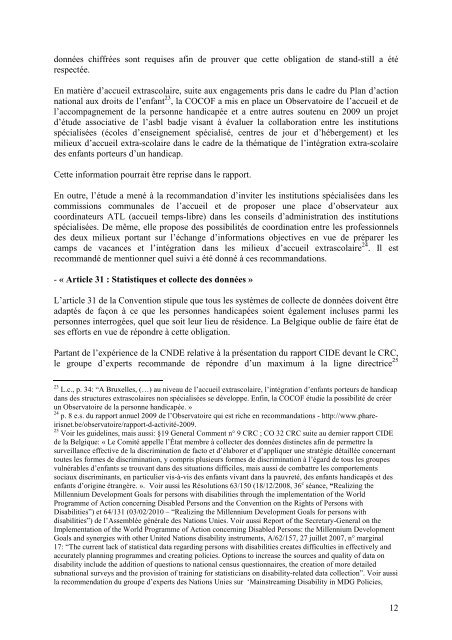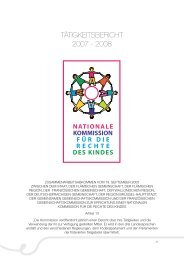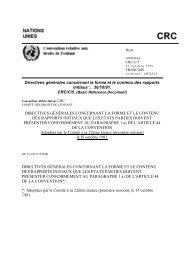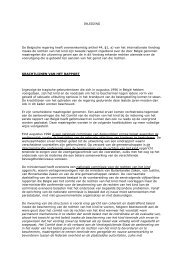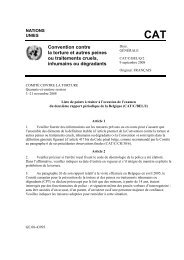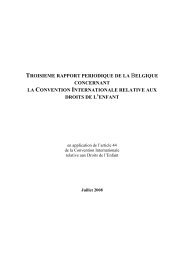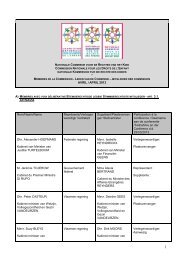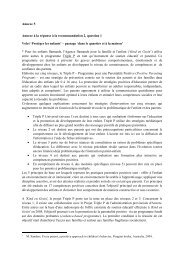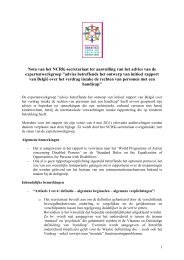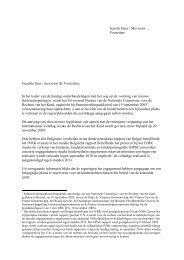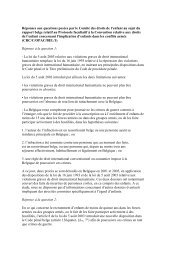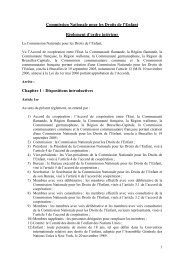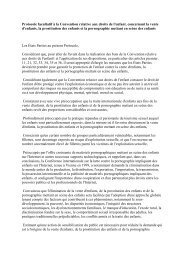1 Message du Bureau Exécutif de la CNDE portant avis du groupe d ...
1 Message du Bureau Exécutif de la CNDE portant avis du groupe d ...
1 Message du Bureau Exécutif de la CNDE portant avis du groupe d ...
Create successful ePaper yourself
Turn your PDF publications into a flip-book with our unique Google optimized e-Paper software.
données chiffrées sont requises afin <strong>de</strong> prouver que cette obligation <strong>de</strong> stand-still a été<br />
respectée.<br />
En matière d’accueil extrasco<strong>la</strong>ire, suite aux engagements pris dans le cadre <strong>du</strong> P<strong>la</strong>n d’action<br />
national aux droits <strong>de</strong> l’enfant 23 , <strong>la</strong> COCOF a mis en p<strong>la</strong>ce un Observatoire <strong>de</strong> l’accueil et <strong>de</strong><br />
l’accompagnement <strong>de</strong> <strong>la</strong> personne handicapée et a entre autres soutenu en 2009 un projet<br />
d’étu<strong>de</strong> associative <strong>de</strong> l’asbl badje visant à évaluer <strong>la</strong> col<strong>la</strong>boration entre les institutions<br />
spécialisées (écoles d’enseignement spécialisé, centres <strong>de</strong> jour et d’hébergement) et les<br />
milieux d’accueil extra-sco<strong>la</strong>ire dans le cadre <strong>de</strong> <strong>la</strong> thématique <strong>de</strong> l’intégration extra-sco<strong>la</strong>ire<br />
<strong>de</strong>s enfants porteurs d’un handicap.<br />
Cette information pourrait être reprise dans le rapport.<br />
En outre, l’étu<strong>de</strong> a mené à <strong>la</strong> recommandation d’inviter les institutions spécialisées dans les<br />
commissions communales <strong>de</strong> l’accueil et <strong>de</strong> proposer une p<strong>la</strong>ce d’observateur aux<br />
coordinateurs ATL (accueil temps-libre) dans les conseils d’administration <strong>de</strong>s institutions<br />
spécialisées. De même, elle propose <strong>de</strong>s possibilités <strong>de</strong> coordination entre les professionnels<br />
<strong>de</strong>s <strong>de</strong>ux milieux <strong>portant</strong> sur l’échange d’informations objectives en vue <strong>de</strong> préparer les<br />
camps <strong>de</strong> vacances et l’intégration dans les milieux d’accueil extrasco<strong>la</strong>ire 24 . Il est<br />
recommandé <strong>de</strong> mentionner quel suivi a été donné à ces recommandations.<br />
- « Article 31 : Statistiques et collecte <strong>de</strong>s données »<br />
L’article 31 <strong>de</strong> <strong>la</strong> Convention stipule que tous les systèmes <strong>de</strong> collecte <strong>de</strong> données doivent être<br />
adaptés <strong>de</strong> façon à ce que les personnes handicapées soient également incluses parmi les<br />
personnes interrogées, quel que soit leur lieu <strong>de</strong> rési<strong>de</strong>nce. La Belgique oublie <strong>de</strong> faire état <strong>de</strong><br />
ses efforts en vue <strong>de</strong> répondre à cette obligation.<br />
Partant <strong>de</strong> l’expérience <strong>de</strong> <strong>la</strong> <strong>CNDE</strong> re<strong>la</strong>tive à <strong>la</strong> présentation <strong>du</strong> rapport CIDE <strong>de</strong>vant le CRC,<br />
le <strong>groupe</strong> d’experts recomman<strong>de</strong> <strong>de</strong> répondre d’un maximum à <strong>la</strong> ligne directrice 25<br />
23 L.c., p. 34: “A Bruxelles, (…) au niveau <strong>de</strong> l’accueil extrasco<strong>la</strong>ire, l’intégration d’enfants porteurs <strong>de</strong> handicap<br />
dans <strong>de</strong>s structures extrasco<strong>la</strong>ires non spécialisées se développe. Enfin, <strong>la</strong> COCOF étudie <strong>la</strong> possibilité <strong>de</strong> créer<br />
un Observatoire <strong>de</strong> <strong>la</strong> personne handicapée. »<br />
24 p. 8 e.s. <strong>du</strong> rapport annuel 2009 <strong>de</strong> l’Observatoire qui est riche en recommandations - http://www.phareirisnet.be/observatoire/rapport-d-activité-2009.<br />
25 Voir les gui<strong>de</strong>lines, mais aussi: §19 General Comment n° 9 CRC ; CO 32 CRC suite au <strong>de</strong>rnier rapport CIDE<br />
<strong>de</strong> <strong>la</strong> Belgique: « Le Comité appelle l’État membre à collecter <strong>de</strong>s données distinctes afin <strong>de</strong> permettre <strong>la</strong><br />
surveil<strong>la</strong>nce effective <strong>de</strong> <strong>la</strong> discrimination <strong>de</strong> facto et d’é<strong>la</strong>borer et d’appliquer une stratégie détaillée concernant<br />
toutes les formes <strong>de</strong> discrimination, y compris plusieurs formes <strong>de</strong> discrimination à l’égard <strong>de</strong> tous les <strong>groupe</strong>s<br />
vulnérables d’enfants se trouvant dans <strong>de</strong>s situations difficiles, mais aussi <strong>de</strong> combattre les comportements<br />
sociaux discriminants, en particulier vis-à-vis <strong>de</strong>s enfants vivant dans <strong>la</strong> pauvreté, <strong>de</strong>s enfants handicapés et <strong>de</strong>s<br />
enfants d’origine étrangère. ». Voir aussi les Résolutions 63/150 (18/12/2008, 36 e séance, “Realizing the<br />
Millennium Development Goals for persons with disabilities through the implementation of the World<br />
Programme of Action concerning Disabled Persons and the Convention on the Rights of Persons with<br />
Disabilities”) et 64/131 (03/02/2010 – “Realizing the Millennium Development Goals for persons with<br />
disabilities”) <strong>de</strong> l’Assemblée générale <strong>de</strong>s Nations Unies. Voir aussi Report of the Secretary-General on the<br />
Implementation of the World Programme of Action concerning Disabled Persons: the Millennium Development<br />
Goals and synergies with other United Nations disability instruments, A/62/157, 27 juillet 2007, n° marginal<br />
17: “The current <strong>la</strong>ck of statistical data regarding persons with disabilities creates difficulties in effectively and<br />
accurately p<strong>la</strong>nning programmes and creating policies. Options to increase the sources and quality of data on<br />
disability inclu<strong>de</strong> the addition of questions to national census questionnaires, the creation of more <strong>de</strong>tailed<br />
subnational surveys and the provision of training for statisticians on disability-re<strong>la</strong>ted data collection”. Voir aussi<br />
<strong>la</strong> recommendation <strong>du</strong> <strong>groupe</strong> d’experts <strong>de</strong>s Nations Unies sur ‘Mainstreaming Disability in MDG Policies,<br />
12


